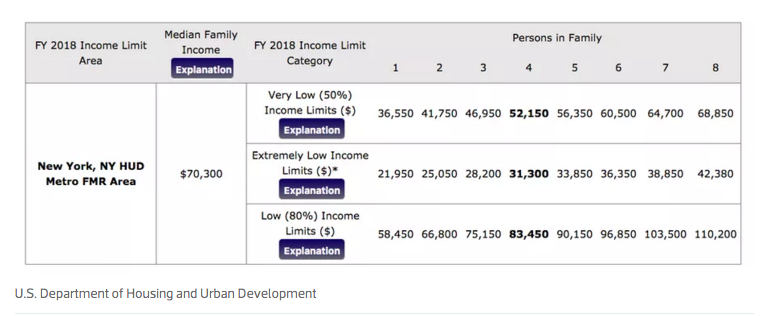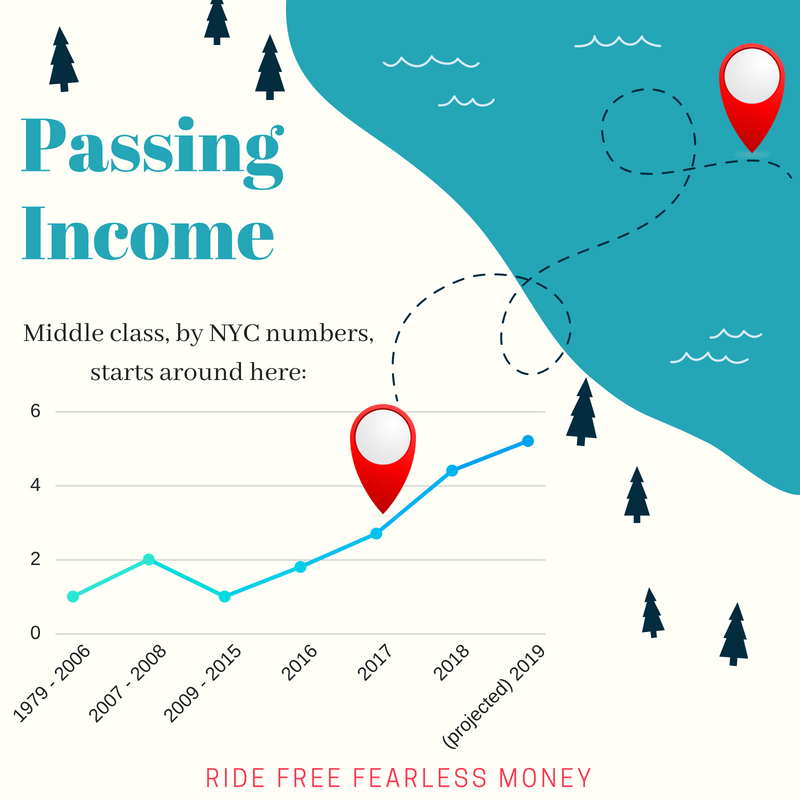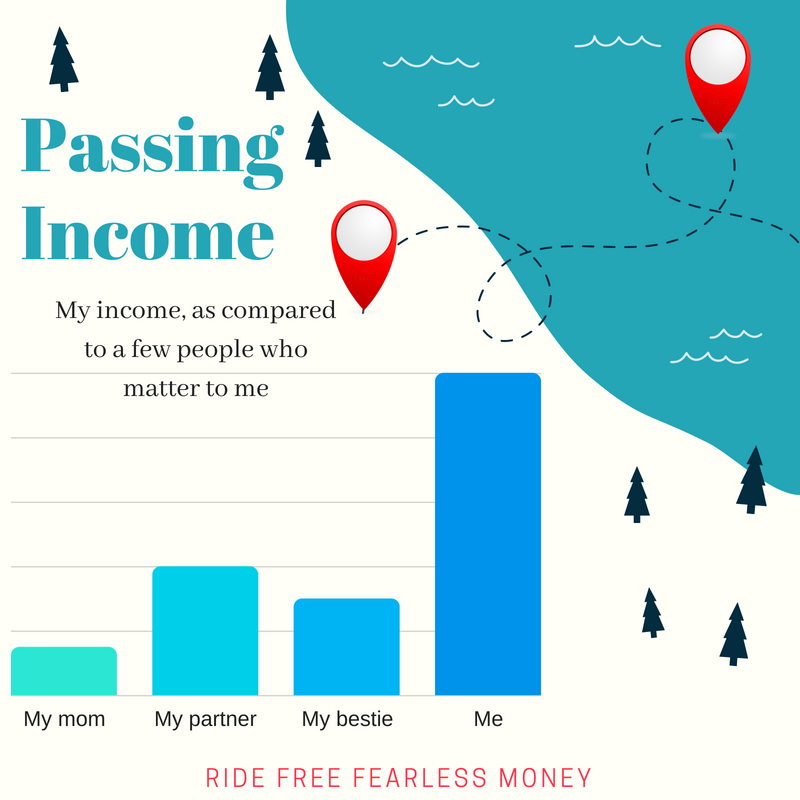My personal story: Introduction
I’m sharing a peek into my personal money, because transparency matters, and because I want to spark a conversation among other people like me: progressive af folks who grew up poor/working class, spent time low-income – and who have financial resources now.
I know you’re out there. You ping me on social media and mutual friends @ me in your posts. We talk as friends, client/coach, strangers. I appreciate you a LOT, since it helps me to see myself in you.
That’s why I’m using my platform to host a discussion group on Mon 10/8 in the evening for folks like us. It’s free, just sign up here: https://bit.ly/2xMk143. Anyone of low-income experience who has class passed upwardly is welcome to attend, with all your complexity, intersections, celebrations and reservations welcomed.
My personal story: Income trajectory
If things stay in their current trajectory, between my job and my businesses, in 2019 I’ll scrape my way into (the bottom of) the top 10% of wage earners in the US.

And I am stoked, grateful as fuck, and 100% committed to keep going.
Especially because through 2016 I was low-income. I don’t come from money, but money sure as hell be coming to me.
My story in the data: what am I “supposed” to be making?
As a New Yorker (I’ve been in the City for 13 years), what counts as low-income here is NOT the same as the rest of the country, because this place is so damn expensive. So, one can make $35 or $40k here and definitely struggle to cover all the basics.
According to the U.S. Department of Housing and Urban Development, the median income in NYC in 2017 was $70,300, and low income was, for a single earner, anything less than 80% of that, or $58,450 [source]:

As a cisgendered, white, able-bodied person with a graduate education I’m already privileged and likely to make higher incomes. As a queer woman from working-class people, that height is lowered quite a bit.
In NYS for example, 37% of LGBTQ women make under $24k annually [source]. 82% of lesbians earn under $75k annually, as compared to 63% of all US adults and 72% for gay men [source/2013 data, note recent findings are more mixed]. We already know there is a gender pay gap of about 82% on the dollar for white women [source] (and more extreme for women of color).
Numbers vary, but about 2 out of 5 US adults are low-income – that is, poor or working class, earning under the [hotly, debated] middle-class salary bracket, which means earning around $40k or less depending which data you go with. As a p/t creative community organizer in the US (see my 2009 – 2015 data point), I hit around or under the $34k average salary, though that was by managing to work professionally part time / there was basically no economy for at least two years of this period.

In late 2015 a couple things happened that resulted in the bump you see in 2016: I got fed up of my teeth being fucked up, for one. I had begun Ride Free and was realizing just how underearn-y I was in relation to most other people and felt mad at myself and empowered to change. I ran the numbers and realized I would never, ever achieve my greatest dream of owning a home I live in at the rate I was going. I read Your Money or Your Life. I got sick of accepting being underpaid for my increasingly awesome and valuable skill set. I started really thinking about my relationship to money, and realized that if I leveraged my privileges I could contribute materially to my broke family and community – and probably unfuck my teeth.
I hustled to land full time jobs that I liked; the first of which eventually brought me to median (middle class for NYC) by 2017. Now I work in tech as a design thinking facilitator / agile coach and tbh I’m hella paid – like I’ll probably pay more in taxes this year than I earned in many of my low-income years paid.
I’m fine with this by the way, taxes fund HUD and medicaid and teachers salaries and libraries and I want those things to be funded. I think it’s a conservative narrative to hate taxes – instead, hate the misuse of our public funds.
It helps that the economy has rebounded for SOME people, now including me. It helps that the average salary in NYC has gone up 7.8% since the great Recession, too [source]. It helps that I busted my ass to get skills that are valued in capitalism. But I’m an outlier, by the data, always have been. It’s just that now I’m on the other side of the bell curve from where I spent a loooong time.
Money is always relational
My more is someone else’s less at any given time, and vice versa. What does it mean when that relationship switches? When you’re used to mostly “less” and then you’re more?

I make 7x what my mom did, doing things she does not understand. “Talking about computers? Sure, honey. You have health insurance, right?”
I make 3x what my partner used to and 13x what she does right now – granted she’s currently living on a meager graduate school stipend. But it’s still a big difference.
If it’s true that your income is the average of the five people closest to you, you’re welcome, fam. Looks like we all just got a raise.
Class straddling: the consumer world is still weird
The concept of being a class straddler means that you’ve experienced more than one economic class in an upwardly mobile way, and comes from great work by Betsy Leondar-Wright.
As my class straddler manifests, I am highly unlikely to buy scented candles or the lifestyle equivalent. I still can’t bring myself to buy organic food regularly, not as long as my mom lives in crappy public housing, which she currently does, and which I am plotting to invest in a multi-unit in her town to get her out of. This is a possible 5 year plan for me. If this was Europe I’d be cool w her having nice public housing but this is the US, so it’s not nice. Public housing here is treated as a punishment.
I do spend some of the money I make, on better food and I even lightly participate in consumer capitalism now. I am planning – not just dreaming – to buy a home of my own. My nails look good all the time. I got my hair cut in NYC and paid market rate for the first time.
I also save 45% of my money (see: planning to buy a home and invest in a multi-unit), and 30% of my income goes to taxes.
I’m frugal by nature, nurture, practice, and politics. It’s exciting to get a few middle-class things like blazers (which I now need), but I deeply believe that buying new things is often wasteful to our earth and of money. For example, I want to purchase a couch, but I am struggling with amazement and disgust at the retail cost of new ones, and might buy lightly used to minimize consumer waste and steward my newfound resources wisely even though I could now easily afford new.
Class passing: feelings
I’m proud, relieved, and pleased to be paid relative to my work’s value in the market. It’s not challenging emotionally for me to make money, it’s awesome. I can keep my teeth / buy implants, help my mom, eat salmon that lived a happy free life, and pass my knowledge along to lift up others.
What’s hard? As a formerly poor person, I never knew if I’d be able to replace anything so I kept a LOT of stuff. I have to learn to let go, and that part is hard. I’m slowly getting myself to get rid of things, starting with the clearly broken crap, then moving onto things I haven’t used in years.
As a straddler I struggle to trust that money is going to be in my future, as the experiential data shows that it won’t, so I have to use energy to generate the belief (and take the actions) that it will be.
As someone formerly working class who deeply values the specific survival and thriving skills and ways of being I learned from being working class, I fear being alienated from the one group of people I never felt alienated by: other babes in the struggle. Living in NYC and watching middle class and upper middle class people this last decade+ taught me how different our expectations and dreams can be.
I dream freedom for broke folks in particular even as I advocate and teach freedom from the malformations of capitalism for us all. I know that an individual’s bootstrapping-ass win like mine is only meaningful when the global struggle for economic justice and self-determination never leaves the picture.
Only some us raise this high – how might we reform economics such that the 9.99% of people above me, who have 85% of the worlds wealth [source], redistribute it outside of the hero models of philanthrophy?
What’s next?
I theoretically could spend more money but I prefer not to, and would rather stack opportunity for my future choices and to share meaningfully, create a safety net since I don’t have one otherwise, and stay hella thoughtful about how I use money.
That said, I once saved $20 a week for three years to buy a motorcycle, so you better believe I’ve got a savings fund going for a similarly joyful purchase because I believe that I deserve joy and have always found ways to access resources to fund that joy. Why stop now?
But first, I’ma get a fucking garage.
Discussion Reminder!
I’m hosting a discussion group call on 10/8 at 8:30p ET / 5:30p PT for other class straddlers, RSVP here: https://bit.ly/2xMk143. Anyone of low-income experience who has class passed upwardly is welcome to attend, with all your complexity, intersections, celebrations and reservations welcomed.

Thanks for sharing. I am also privileged but I found that having unfucked teeth made that even more true. People make certain assumptions about persons with bad teeth.